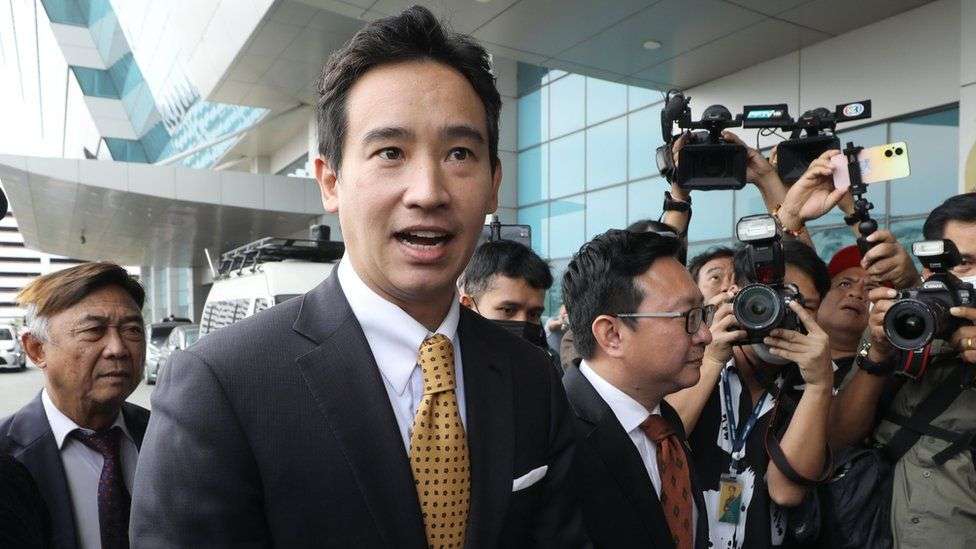The Thai pro-democracy party which won the most votes at last year's election could now be forced to dissolve after a court ruled its key policy illegal.
Move Forward is not in government but its promises to campaign on changing royal defamation laws violated the constitution, a Thai court has found.
Such lese majeste laws have increasingly been used to stifle political criticism, activists say.
It is possible Move Forward's leader could now be banned from politics.
Pita Limjaroenrat, a young, Harvard-educated politician, had been viewed as a significant threat to Thailand's monarchy and military-aligned elite, winning over a majority of voters in 2023 with his party's promises to rein in their influence.
His attempts to be nominated prime minister, however, were then blocked by the unelected Senate.
Last week he survived another legal case aimed at disqualifying him from parliament. But he and his party failed to win the crucial second case on Wednesday on their key policy platform.
The Constitutional Court ruled that Move Forward's campaign promise to amend the lese majeste law amounted to an attempt to overthrow the entire political system in Thailand.
The verdict carries no immediate penalty, but is widely expected to be used to justify dissolving Move Forward, and banning its leaders from politics for several years.
By ruling this way, the court has in effect made the lese majeste law untouchable - even by an elected parliament.
The law has been widely criticised for stifling freedom of expression in Thailand and for its harsh operation.
Earlier this month, a 30-year-old man in Bangkok was sentenced to 50 years in jail for criticising the Thai monarchy.
And more than 260 people have been charged under the law since November 2020 - a date stamp tied to the beginning of King Maha Vajiralongkorn's reign.
Wednesday's ruling in the Thai courts also sends a clear message that any discussion of the powerful monarchy will not be permitted.
Four years ago Move Forward's previous incarnation, a party called Future Forward, was also dissolved after doing unexpectedly well in an election.
That action by the Constitutional Court set off months of student-led protests, in which unprecedented demands were made for changes to the monarchy.
Today, many of the leaders of those protests find themselves fighting charges under the lese majeste law, and could face many years in prison.
The court has also previously ruled on the legality of calling for a change to lese majeste.
In November 2021 the court ruled that three leading activists who called for reform of the monarchy during the months-long protests of 2020 had "hidden intentions to overthrow the constitutional monarchy".
It ordered them to stop and all three have faced multiple criminal charges since then.
This latest verdict, though, states that even suggesting changes to the lese majeste law is unacceptable.
Move Forward had argued that it was the legitimate role of an elected parliament to scrutinise a law which is part of the regular penal code. Thailand's lese majeste law has already been significantly changed twice.
Moreover, in its election campaign the party shied away from activist demands for a complete abolition of the law, calling only for amendment. It won far more votes than any other party on that platform, even if much of its support was for its other proposed reforms, so could legitimately claim a public mandate for it.
But the judges ruled that Move Forward and its leaders "demonstrated behaviour" which amounted to calling for the overthrow of Thailand's democratic system of government with the King as Head of State.
It ordered them stop any acts or expression of views, through any medium, which advocated abolition of the lese majeste law, and prohibited amendments to the law by any means other than "lawful legislative measures".
That suggests it might be possible to change the law through parliament, but that no public discussion or social media debate will be allowed.
Given the number of times in Thailand that political parties have been dissolved and leaders banned from politics on much flimsier pretexts, there will now be strong pressure to do the same to Move Forward.
Some Thais will conclude that this was always the real objective of the petition to the court.








